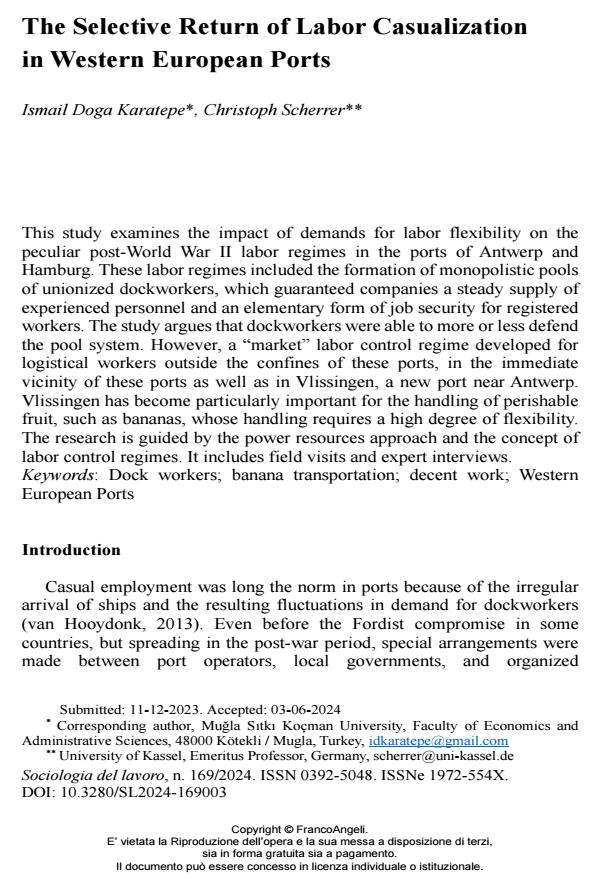The Selective Return of Labor Casualization in Western European Ports
Titolo Rivista SOCIOLOGIA DEL LAVORO
Autori/Curatori Ismail Doga Karatepe, Christoph Scherrer
Anno di pubblicazione 2024 Fascicolo 2024/169
Lingua Inglese Numero pagine 21 P. 52-72 Dimensione file 261 KB
DOI 10.3280/SL2024-169003
Il DOI è il codice a barre della proprietà intellettuale: per saperne di più
clicca qui
Qui sotto puoi vedere in anteprima la prima pagina di questo articolo.
Se questo articolo ti interessa, lo puoi acquistare (e scaricare in formato pdf) seguendo le facili indicazioni per acquistare il download credit. Acquista Download Credits per scaricare questo Articolo in formato PDF

FrancoAngeli è membro della Publishers International Linking Association, Inc (PILA), associazione indipendente e non profit per facilitare (attraverso i servizi tecnologici implementati da CrossRef.org) l’accesso degli studiosi ai contenuti digitali nelle pubblicazioni professionali e scientifiche.
This study examines the impact of demands for labor flexibility on the peculiar post-World War II labor regimes in the ports of Antwerp and Hamburg. These labor regimes included the formation of monopolistic pools of unionized dockworkers, which guaranteed companies a steady supply of experienced personnel and an elementary form of job security for registered workers. The study argues that dockworkers were able to more or less defend the pool system. However, a “market” labor control regime developed for logistical workers outside the confines of these ports, in the immediate vicinity of these ports as well as in Vlissingen, a new port near Antwerp. Vlissingen has become particularly important for the handling of perishable fruit, such as bananas, whose handling requires a high degree of flexibility. The research is guided by the power resources approach and the concept of labor control regimes. It includes field visits and expert interviews.
Lo studio prende in esame l’impatto delle richieste di flessibilità del lavoro sui peculiari regimi lavorativi del secondo dopoguerra nei porti di Anversa e Amburgo. Tali regimi lavorativi includevano la formazione di pool monopolistici di lavoratori portuali sindacalizzati, che garantivano alle aziende una fornitura costante di personale esperto e una forma elementare di sicurezza del lavoro per i lavoratori registrati. Lo studio riporta come i lavoratori portuali siano stati in grado di difendere più o meno il sistema dei pool. Tuttavia, un regime di controllo del lavoro di “mercato” si è sviluppato per i lavoratori logistici al di fuori dei confini di questi porti, nelle immediate vicinanze di questi porti così come a Vlissingen, un nuovo porto vicino ad Anversa. Vlissingen è diventato, quindi, un luogo particolarmente importante per la movimentazione di frutta deperibile, come le banane, la cui movimentazione richiede un elevato grado di flessibilità. La ricerca è guidata dall’approccio delle risorse di potere e dal concetto di regimi di controllo del lavoro e comprende visite sul campo e interviste agli esperti.
Parole chiave:lavoratori portuali; trasporto di banane; lavoro dignitoso; porti dell’Europa occidentale
Ismail Doga Karatepe, Christoph Scherrer, The Selective Return of Labor Casualization in Western European Ports in "SOCIOLOGIA DEL LAVORO " 169/2024, pp 52-72, DOI: 10.3280/SL2024-169003